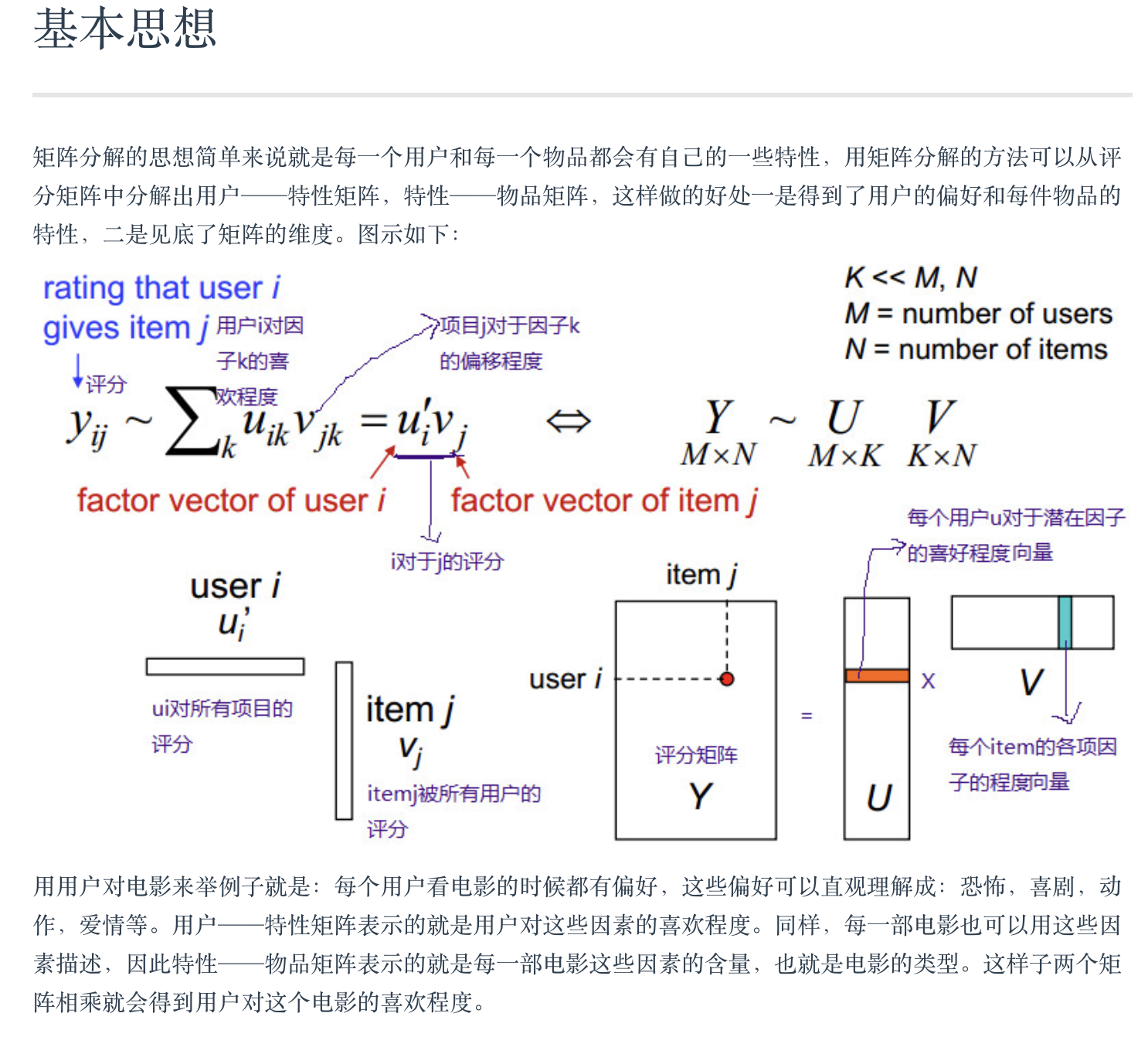Understanding matrix factorization for recommendation
http://nicolas-hug.com/blog/matrix_facto_4

import numpy as np
import surprise # run 'pip install scikit-surprise' to install surprise
from surprise.model_selection import cross_validate
class MatrixFacto(surprise.AlgoBase):
'''A basic rating prediction algorithm based on matrix factorization.'''
def __init__(self, learning_rate, n_epochs, n_factors):
self.lr = learning_rate # learning rate for SGD
self.n_epochs = n_epochs # number of iterations of SGD
self.n_factors = n_factors # number of factors
def fit(self, trainset):
'''Learn the vectors p_u and q_i with SGD'''
print('Fitting data with SGD...')
# Randomly initialize the user and item factors.
p = np.random.normal(0, .1, (trainset.n_users, self.n_factors))
q = np.random.normal(0, .1, (trainset.n_items, self.n_factors))
# SGD procedure
for _ in range(self.n_epochs):
for u, i, r_ui in trainset.all_ratings():
err = r_ui - np.dot(p[u], q[i])
# Update vectors p_u and q_i
p[u] += self.lr * err * q[i]
q[i] += self.lr * err * p[u]
# Note: in the update of q_i, we should actually use the previous (non-updated) value of p_u.
# In practice it makes almost no difference.
self.p, self.q = p, q
self.trainset = trainset
def estimate(self, u, i):
'''Return the estmimated rating of user u for item i.'''
# return scalar product between p_u and q_i if user and item are known,
# else return the average of all ratings
if self.trainset.knows_user(u) and self.trainset.knows_item(i):
return np.dot(self.p[u], self.q[i])
else:
return self.trainset.global_mean
# data loading. We'll use the movielens dataset (https://grouplens.org/datasets/movielens/100k/)
# it will be downloaded automatically.
data = surprise.Dataset.load_builtin('ml-100k')
#data.split(2) # split data for 2-folds cross validation
algo = MatrixFacto(learning_rate=.01, n_epochs=10, n_factors=10)
#surprise.evaluate(algo, data, measures=['RMSE'])
cross_validate(algo, data, measures=['RMSE', 'MAE'], cv=5, verbose=True)
Understanding matrix factorization for recommendation的更多相关文章
- Matrix Factorization SVD 矩阵分解
Today we have learned the Matrix Factorization, and I want to record my study notes. Some kownledge ...
- 关于NMF(Non-negative Matrix Factorization )
著名的科学杂志<Nature>于1999年刊登了两位科学家D.D.Lee和H.S.Seung对数学中非负矩阵研究的突出成果.该文提出了一种新的矩阵分解思想――非负矩阵分解(Non-nega ...
- Matrix Factorization, Algorithms, Applications, and Avaliable packages
矩阵分解 来源:http://www.cvchina.info/2011/09/05/matrix-factorization-jungle/ 美帝的有心人士收集了市面上的矩阵分解的差点儿全部算法和应 ...
- 机器学习技法:15 Matrix Factorization
Roadmap Linear Network Hypothesis Basic Matrix Factorization Stochastic Gradient Descent Summary of ...
- 《Non-Negative Matrix Factorization for Polyphonic Music Transcription》译文
NMF(非负矩阵分解),由于其分解出的矩阵是非负的,在一些实际问题中具有非常好的解释,因此用途很广.在此,我给大家介绍一下NMF在多声部音乐中的应用.要翻译的论文是利用NMF转录多声部音乐的开山之作, ...
- 机器学习技法笔记:15 Matrix Factorization
Roadmap Linear Network Hypothesis Basic Matrix Factorization Stochastic Gradient Descent Summary of ...
- Non-negative Matrix Factorization 非负矩阵分解
著名的科学杂志<Nature>于1999年刊登了两位科学家D.D.Lee和H.S.Seung对数学中非负矩阵研究的突出成果.该文提出了一种新的矩阵分解思想――非负矩阵分解(Non-nega ...
- 【RS】Sparse Probabilistic Matrix Factorization by Laplace Distribution for Collaborative Filtering - 基于拉普拉斯分布的稀疏概率矩阵分解协同过滤
[论文标题]Sparse Probabilistic Matrix Factorization by Laplace Distribution for Collaborative Filtering ...
- 【RS】List-wise learning to rank with matrix factorization for collaborative filtering - 结合列表启发排序和矩阵分解的协同过滤
[论文标题]List-wise learning to rank with matrix factorization for collaborative filtering (RecSys '10 ...
随机推荐
- Andrew Ng机器学习课程9
Andrew Ng机器学习课程9 首先以一个工匠为例,说明要成为一个出色的工匠,就需要掌握各种工具的使用,才能知道在具体的任务中选择什么工具来做.所以今天要讲的就是机器学习的理论部分. bias va ...
- js判断json对象是否为空
if("{}" == JSON.stringify(json对象)) { // 满足条件就是空 }
- Python 数据处理库pandas教程(最后附上pandas_datareader使用实例)
0 简单介绍 pandas是一个Python语言的软件包,在我们使用Python语言进行机器学习编程的时候,这是一个非常常用的基础编程库.本文是对它的一个入门教程. pandas提供了快速,灵活和富有 ...
- LeetCode 442. 数组中重复的数据(Find All Duplicates in an Array) 17
442. 数组中重复的数据 442. Find All Duplicates in an Array 题目描述 Given an array of integers, 1 ≤ a[i] ≤ n (n ...
- 【转帖】K8S Deployment 命令
K8S Deployment 命令 https://www.cnblogs.com/Tempted/p/7831604.html 今天学习了一下 kubectl scale deployment xx ...
- 又是a+b
题目描述: 给定两个整数 a, b (a, b 均不超过 int 类型的表示范围),求出 a + b 的和.输入描述: 多组输入,每组输入为一行,里面有 2 个数 a, b.输出描述: 对于每一组输入 ...
- 几个有益的 CSS 小知识
样式的顺序 CSS 代码: HTML 代码: 记得之前这是一道比较火的 CSS 考题,当时好像是有不少的人答错(30% 以上) 答案你们应该是知道的. 可以这样提升 CSS 性能 后代选择器 ...
- VUE框架概括+模块语法使用(上)
vue是什么 官网(https://cn.vuejs.org/) Vue.js是一套构建用户界面的渐进式框架.与其他重量级框架不同的是,Vue 采用自底向上增量开发的设计: Vue 的核心库只关注视图 ...
- Golang高并发抓取HTML图片
Golang高并发抓取HTML图片 使用准备 1.安装Golang 2.下载爬虫包 go get -v github.com/hunterhug/marmot/util go get -v githu ...
- Django Rest framework的限流实现流程
目录 一 什么是throttle 二 Django REST framework是如何实现throttle的 三 Django REST framework中throttle源码流程 一 什么是thr ...
